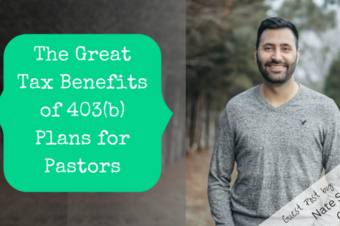Recently, I explained to you what financial planning is. Just like pastoring is a whole lot more than just preaching, financial planning is a whole lot more than just investments. If you haven’t read that article, I would recommend reading it here before continuing on.
I gave an overview of the different areas of financial planning in that article and now today we will do a deep dive and look at some examples of how that plays out for pastors and the strategies that we use that are unique to people in your position. Let’s start with the clergy housing allowance. That’s an easy one, right? Just maximize it and save on taxes? Not always. Let me show you how a financial planner approaches these things.
Housing Allowance
Sometimes maximizing your housing allowance can actually cost you money. Take, for example, the child tax credit. A portion of the child tax credit is refundable, meaning the government gives you the money even if you don’t owe any taxes. However, the refundable portion is limited by your taxable income. Claiming a lower housing allowance increases your taxable income and your refundable credit. In this manner, you can actually end up ahead by lowering your housing allowance.
Your tax preparer isn’t going to tell you this, though. Their job is to report your numbers accurately, not help you strategize and plan for the future. That’s what a financial planner does. A good planner understands the interplay between the child tax credit and the housing allowance and will help you calculate a housing allowance amount that allows you to maximize the benefits of both.
Charitable Giving
One thing I know about pastors is that you are incredibly generous. Not just because you’re laying down your life and the potential for a more lucrative career for the church, but you tithe. You give to missionaries. You support children in Guatemala. You help finance church plants. Those are all things that can be tax-deductible if you itemize your deductions. Unfortunately, hardly anyone itemizes their deductions with the current standard deduction. When you claim the standard deduction, you don’t get a tax benefit for charitable giving. While your treasure in heaven is increasing, your tax bill is staying the same.
There are strategies for getting a tax benefit for your current level of charitable giving, even if you usually claim the standard deduction. You can utilize a bunching strategy and donor-advised fund. These things get a little complex, but a financial planner can walk you through it as if they do it every day. Because, well, they do.
Retirement
What about retirement? Thinking about retirement is one of the most common things that inspires people to look for professional financial help. What does a financial planner do that an online retirement savings calculator and an account-rebalancing robo-advisor can’t do? Strategize. Apply the tax law to you personally. Help you understand your trade-offs and weigh them before making a decision.
Where to Save for Retirement
If you’re young and starting out, the internet will tell you that a Roth IRA is the best place for you to save for retirement. But if you’re a pastor, there’s a good chance that’s not true. Even if you have to pay higher fees in your 403(b). A financial planner who understands clergy taxation will help you analyze your options to see which type of account is best in your specific situation.
Housing Allowance in Retirement
The generic advice is to roll your 403(b) account into an IRA when you retire. However, if you read this blog, you know that leaving your money in your 403(b) makes it eligible for the housing allowance in retirement. But should you leave all your money in your 403(b) or move some of it out? That can only be determined by a financial planner addressing your unique situation, not this blog.
You see, it might be best to move some of the money from your 403(b) into an IRA. You can only claim a housing allowance as long as you, the pastor, are alive. Your spouse can’t claim a housing allowance after you die and your heirs cannot claim one either. Everything in your 403(b) will be taxable once you are gone. Depending on your situation and the costs and investments available in your 403(b), you might want to move some of your money.
Qualified Charitable Distributions
Once you reach age 70 ½, you can do something called a Qualified Charitable Distribution (QCD) from an IRA where you send a check directly from the IRA to a charity and it completely bypasses your tax return. It is never reported to the IRS and does not count as taxable income. If you’re planning on making charitable donations in your later years, this is a great way to do it.
QCDs can only be made from an IRA, so it might be best in your situation to move some of your 403(b) into an IRA for charitable purposes. The money still comes out tax-free and you lower the balance of the 403(b) that your spouse or heirs may have to pay taxes on. Remember, we never know when God will call us heavenward and it’s all taxable after that.
Roth Conversions
Another way to minimize taxes from your retirement accounts is through Roth conversions. This is where you move money from a traditional pre-tax account to an after-tax account by paying taxes on it in the current year. You may have some low-income years, perhaps after you retire and before you start collecting Social Security benefits or while you take time off to go to seminary and live off of savings (so much better than student loans!). If your income is lower than the standard deduction, then you can convert the difference from a traditional account to a Roth IRA completely tax-free. It may even make sense to convert some of the account at a 10% or 12% tax rate if you think that your taxes will be higher in the future.
How I Can Help
How do you know how to balance keeping money in your 403(b) for the housing allowance and rolling it into an IRA for QCDs or converting it to a Roth? Work with a financial planner! If you wanted to figure this stuff out yourself, you would have been a financial planner instead of a pastor. Tax strategies just don’t excite you the way that saving souls and helping people does.
The thing is, tax strategies actually excite me. It’s a little embarrassing because it proves that I’m a total nerd, but it’s true. Since I’m into this stuff, I figured I might as well embrace it and use my nerdiness to help people like you. So I became a financial planner.
Yes, I don’t just write this blog, I am a financial planner. I am state-registered to provide investment and financial advice to individual clients. The best part is, I don’t work alone. I’m part of an amazing team at Guide Financial Planning, so if you work with me, you’ll probably get to meet some of them too.
If you’re looking for professional help, our team at Guide Financial Planning would be honored to have the opportunity to serve you. You can schedule a call with this link so we can get to know you, tell you more about ourselves, and see what the future may hold for us.
PS – While I love pastors, I’m trained to work with the sheep as well. If you know any nice ones looking for financial help, go ahead and send them my way. My team and I would be honored to serve them as well.




















